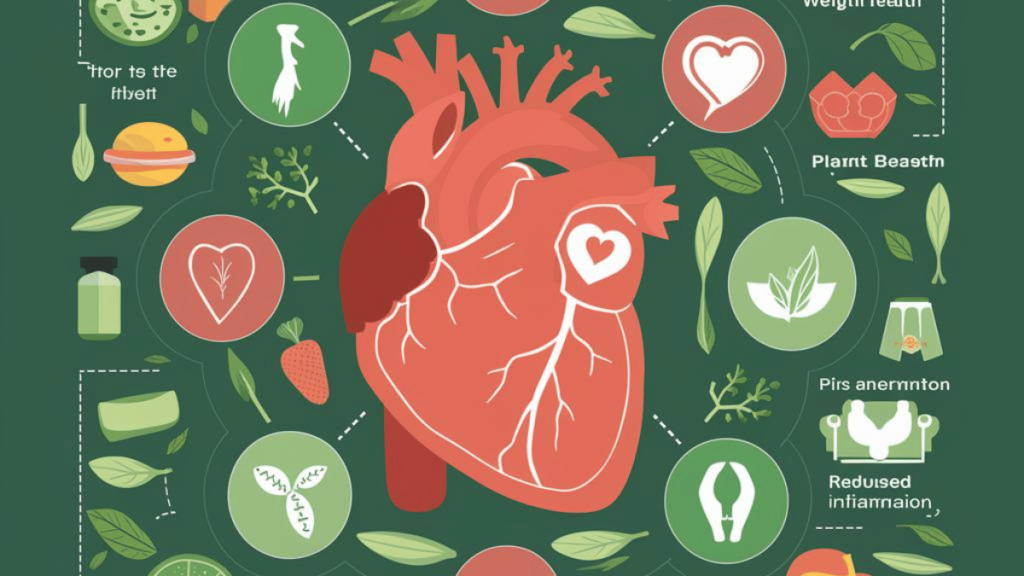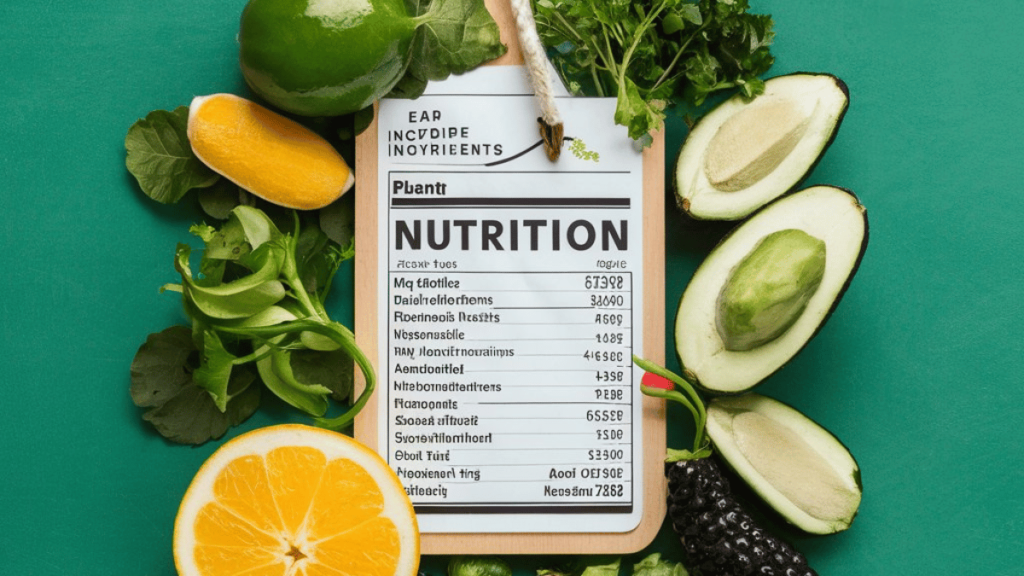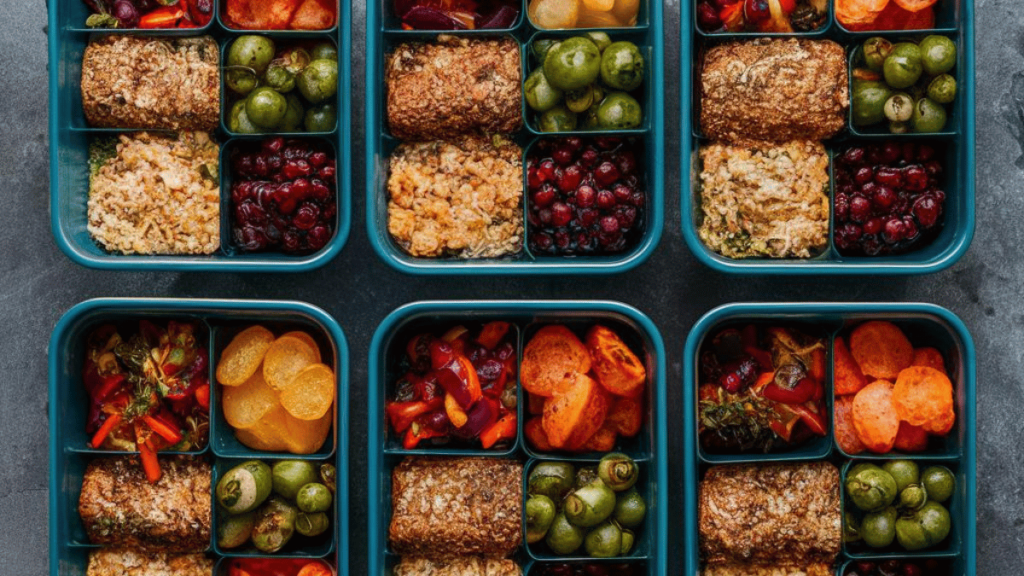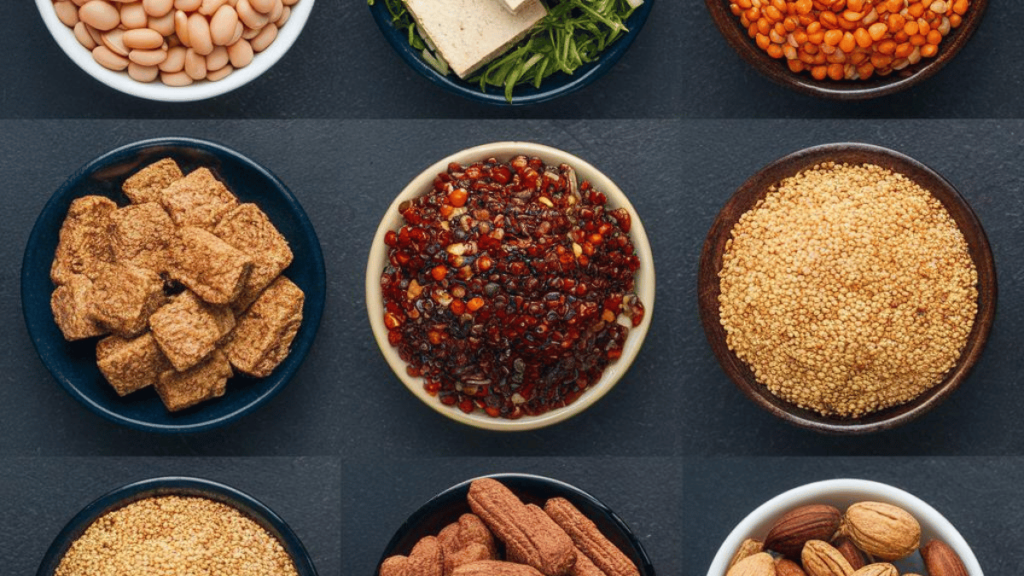How to Transition to a Plant-Based Diet for Optimal Health

Can transitioning to a plant-based diet be challenging? Is there a way you can make it more manageable to transition to a plant-based diet?
Indeed, there is hope.
This article provides an overview of the benefits of transitioning to a plant-based diet for optimal health and tips on how to make the transition easier and more enjoyable.
We’ll use practical strategies. Switching to a plant-based diet can be successful and offer many benefits.
Let’s dive in and look at plant-based diets.
Understanding Plant-Based Diets
To succeed at a plant-based diet, you must understand what it involves. You must also know about the different approaches you can take.
The reason…
Plant-based diets include many eating patterns. They all focus on eating foods from plants.
Types of Plant-Based Diets
Veganism
Veganism is the most restrictive plant-based diet. It excludes all animal products like meat, fish, dairy, eggs, and honey.
Vegans rely entirely on plant sources for their nutrition.
Vegetarian
There are several sub-categories of vegetarianism:
Lacto-Ovo-Vegetarians
Consume dairy and eggs but no meat or fish.
Lacto-Vegetarians
Include dairy but exclude eggs, meat, and fish.
Ove Vegetarians
Eat eggs but avoid dairy, meat, and fish.
Flexitarian
This diet, also known as semi-vegetarian, involves mostly eating plants but includes meat, fish, or other animal products. It offers flexibility and can be an excellent start for those new to plant-based diets.
Essential Nutrients in Plant-Based Diets
Plant-based diets can provide all the needed nutrients for good health. They require thorough planning.

Essential nutrients to focus on include:
- Protein: Found in legumes, nuts, seeds, and whole grains.
- Iron: Abundant in leafy greens, legumes, and fortified foods.
- Calcium: Present in leafy greens, fortified plant milk, and certain nuts.
- Vitamin B12: Often requires supplementation or consumption of fortified foods.
- Omega-3 fatty acids: Flaxseeds, chia seeds, and walnuts contain these fatty acids.
Common Misconceptions
It’s essential to address some common myths about plant-based diets:
Plant-based diets, when well-planned, supply adequate protein levels efficiently.
Lack of Energy
Many people report increased energy levels after transitioning.
Expensive
While some speciality products can be pricey, staple plant-based foods are often economical.
Boring or Restrictive
Plant-based diets can be diverse, flavourful, and satisfying with proper planning and creativity.
Knowing these basics will help you transition to a plant-based diet more effectively.
It will ensure you make informed choices that support your health and wellness goals.
Let’s explore the health benefits you’ll get from a plant-based diet.
Health Benefits of a Plant-Based Diet

Eating a plant-based diet can bring many health benefits. Many studies support this.
These benefits come from the nutrients in plant foods. They also come from avoiding some animal products.
Let’s explore some of the vital health advantages:
Reduced Risk of Chronic Diseases
Heart Disease
Diets based on plants have low levels of saturated fats and cholesterol.
They are also rich in fibre and antioxidants. This mix can lower blood pressure. It also reduces harmful cholesterol levels and the risk of heart disease.
Type 2 Diabetes
Many plant-based foods have high fibre and a low glycemic index. Eating plant-based foods can help regulate blood sugar levels and improve insulin sensitivity. This property of plant-based foods may lower the risk of developing type 2 diabetes or assist in managing the condition.
Certain Cancers
Eating many fruits, vegetables, and whole grains provides many phytochemicals and antioxidants. They may help protect against many types of cancer, especially colorectal cancer.
Weight Management
Plant-based diets are often lower in calories. They also have more fibre than traditional Western diets.
This plant-based diet property can lead to improved satiety and better weight management.
Many find it easier to stay healthy or lose excess pounds. They do so by following a well-planned plant-based diet.
Improved Digestion
Plant-based diets have high fibre. They help with healthy digestion and regular bowel movements.
It can prevent constipation.
It can also reduce the risk of diverticular disease and support a healthy gut microbiome.
Enhanced Energy Levels
Switching to a plant-based diet has been reported to boost energy and overall vitality in many individuals.
This high energy may be from eating more complex carbohydrates. They provide lasting energy. These carbohydrates also contain many vitamins and minerals, which support bodily functions.
Better Skin Health
These diets have many antioxidants, vitamins, and minerals. They can lead to healthier, clearer skin.
Some people see better skin after switching to a plant-based diet. Change includes improvements in acne, eczema, and skin appearance.
Reduced Inflammation
Plant-based diets are naturally anti-inflammatory. They have many antioxidants and phytochemicals.
Eating plant-based diets can lower the risk of inflammation. They also prevent conditions like arthritis. They help with better health and long life.
Environmental and Ethical Benefits
This benefit is not about personal health.
But, plant-based diets have a lower impact on the environment. They also align with ethical concerns about animal welfare.
These factors can add to well-being. They bring satisfaction to many people.
These benefits are significant. You see them most when following a well-planned, balanced, plant-based diet.
This diet includes many types of whole foods.
Simply cutting out animal products won’t bring the same health benefits. You need to ensure proper nutrition.
It is recommended to seek advice from a healthcare professional or dietitian before changing your diet. They can help you meet your needs.
Let’s help you plan your transition to a plant-based diet.
Planning Your Transition
Switching to a plant-based diet is a significant change. It needs careful planning and thought.
Approach this change strategically. It will set you up for long-term success and reduce potential challenges.
Here’s how to plan your transition effectively:
Setting realistic Goals
Begin by clearly defining your objectives.
Are you aiming for better health, weight loss, environmental impact, or ethical reasons?
Knowing why you are doing something will help you stay dedicated when faced with difficulties.
Establish SMART goals to help you navigate through your journey effectively.
Gradual vs. Immediate Transition
Decide whether a gradual or immediate transition suits you best:
Gradual Transition
This approach involves slowly reducing animal products while increasing plant-based options. It allows your body and taste buds to adjust gradually and can be less overwhelming.
Immediate Transition
Some people prefer to switch all at once. While this can be more challenging, it may work well for those who thrive on dramatic changes.
Creating a Timeline
Develop a realistic timeline for your transition.
If opting for a gradual approach, you might:
- Week 1-2: Replace one meal per day with a plant-based option
- Week 3-4: Increase to two plant-based meals per day
- Week 5-6: Aim for entirely plant-based days with occasional animal products
- Week 7-8: Transition to an entirely plant-based diet
Adjust this timeline based on your personal needs and comfort level.
Involving Family and Friends
Communicate your decision to family and friends. Their support can be crucial for your success. If you’re responsible for feeding others, consider:
- Gradually introducing plant-based meals to the family
- Preparing separate meals if necessary
- Educating family members about the benefits of plant-based eating
- Finding compromises that work for everyone
Consult a healthcare pro. Before significant diet changes, talking to a healthcare provider or dietitian is wise.
They can:
- Assess your current health status
- Identify potential nutrient deficiencies to watch for
- Offer tailored guidance according to your medical background.
- Help monitor your progress and adjust your plan as needed.
Educating Yourself
Invest time in learning about plant-based nutrition.
This includes:
- Reading reputable books and scientific articles
- Watching documentaries on plant-based diets
- Following plant-based nutritionists and dietitians on social media
- Attending workshops or cooking classes focused on plant-based cuisine
Preparing Your Environment
Set yourself up for success by:
- Clearing out non-plant-based items from your pantry and fridge
- Stocking up on plant-based staples
- Investing in helpful kitchen tools (e.g., a good blender, food processor)
- Finding plant-based-friendly restaurants in your area
Tracking Your Progress
It is vital to keep a journal to track your transition.
Please note any changes you experience in your health, energy levels, and well-being.This practice can provide motivation and help you identify areas needing adjustment.
Being Flexible and Kind to Yourself
Remember that perfection isn’t the goal. There may be setbacks or occasions where you consume animal products. See these as learning experiences, not failures. Keep moving forward on your plant-based journey.
Plan your transition carefully.
Then, you’ll be better able to overcome challenges. For best health, you can adopt a plant-based diet.
Remember, each person’s journey is unique. Find what works best for you and your life.
Essential Steps for Transitioning
Switching to a plant-based diet requires a method. It ensures success and keeps you healthy.
Follow these essential steps to make your transition smooth and sustainable:
Educate Yourself About Plant-Based Nutrition

Study the basics of macronutrients. These are carbs, proteins, and fats. Also, learn about micronutrients, which are vitamins and minerals, in plant-based foods.
Learn about complete protein sources and how to combine plant proteins effectively.
Recognizing the significance of vitamin B12, iron, calcium, and omega-3 in your diet is essential. These are vital in a plant-based diet.
Start with Familiar Plant-Based Meals
Identify meals you already enjoy that are plant-based or can be easily modified.
Begin incorporating these meals more frequently into your diet.
Examples: vegetable stir-fries, bean burritos, lentil soups, or vegetable-packed pasta dishes.
Gradually Replace Animal Products
- Start by replacing one animal product at a time.
- For example, switch cow’s milk to plant-based alternatives like almond, soy, or oat milk.
- Experiment with plant-based meat substitutes to replace meat in familiar recipes.
- Try egg replacements in baking, such as flax eggs or commercial egg substitutes.
Experiment with New Recipes and Ingredients
- Explore cookbooks, websites, and social media for plant-based recipe ideas.
- Try one new plant-based recipe each week to expand your culinary horizons.
- Experiment with unfamiliar ingredients like nutritional yeast, tempeh, or seitan.
- Consider attending cooking classes or watching online tutorials to learn new plant-based cooking techniques.
Learn to Read Nutrition Labels

- Learn about ingredients that may contain animal products. For example, whey, casein, and gelatin.
- Look for hidden animal-derived additives in processed foods.
- Pay attention to nutrients. This knowledge is essential for fortified foods. They can help meet specific needs.
Stock Your Pantry with Plant-Based Staples
- Start by stocking up on shelf-stable items, such as whole grains, legumes, nuts, seeds, and dried fruits.
- Keep a variety of canned beans and vegetables for quick meal preparation.
- Stock up on plant-based condiments and seasonings to enhance flavours.
- Invest in nutritional supplements if recommended by your healthcare provider.

Plan Meals and Snacks in Advance
- Develop a weekly meal plan to ensure balanced nutrition and variety.
- Prepare larger batches of meals for leftovers or freezing.
- Keep healthy, plant-based snacks on hand. This helps you avoid going back to non-plant-based options when hungry.
- Use meal-planning apps or create a physical meal-planning calendar.
Address Potential Nutrient Deficiencies
- Pay special attention to vitamin B12, iron, calcium, vitamin D, and omega-3 fatty acids.
- Incorporate fortified foods or consider supplements as needed.
- Eat foods rich in these nutrients often. These include leafy greens, nuts, seeds, and fortified plant milks.
- Monitor your health and energy levels. If you have any concerns, consult with a healthcare provider.
Embrace Variety and Colour in Your Diet
Include various fruits and vegetables in your meals. And ensure you get a wide range of essential nutrients.
Rotate your protein sources among legumes, tofu, tempeh, seitan, and plant-based protein powders.
Experiment with different whole grains beyond just rice and wheat.
Stay Hydrated
Increase your water intake, especially if you’re consuming more fibre-rich foods.
Explore herbal teas and infused waters for variety.
Listen to Your Body
- Be mindful of various foods’ effects on your body and how they make you feel.
- Adjust your diet based on energy levels, digestion, and well-being.
- Be patient with yourself as your body adapts to the new diet.
Seek Support and Community
- Join online forums or local groups focused on plant-based eating.
- Share your experiences with friends and family who can provide you with support along the way.
- Consider working with a plant-based nutritionist or dietitian for personalized guidance.
By following these key steps, you’ll be ready to navigate your shift to a plant-based diet.
Remember, make small, lasting changes. They must fit your life and preferences. That is key.
Overcoming Challenges
Transitioning to a plant-based diet can present various challenges.
Being ready for these obstacles and knowing how to beat them will help you stay committed to your new lifestyle.
Here are some common challenges and strategies to address them:
Dealing with Cravings
- Identify trigger foods and find plant-based alternatives
- Example: Replace cheese cravings with nutritional yeast-based sauces or cashew-based spreads
- Allow yourself time to adjust; cravings often diminish over time
- Focus on the abundance of new foods you’re enjoying rather than what you’re giving up
- If needed, consider a gradual transition to help manage cravings more effectively
Eating Out and Social Situations
- Research restaurant menus in advance and look for plant-based options
- Don’t hesitate to ask for modifications to make dishes plant-based
- Suggest restaurants with diverse menus when dining with others
- Offer to bring a plant-based dish to social gatherings
- Communicate your dietary choices clearly but non-judgmentally to friends and family
- Be prepared with snacks for situations where plant-based options might be limited
Managing Protein Intake
- Educate yourself on plant-based protein sources (legumes, tofu, tempeh, seitan, quinoa)
- Make sure to include different types of protein in your meals throughout the day.
- Consider using a nutrient-tracking app to ensure you’re meeting protein needs.
- Experiment with plant-based protein powders for convenient protein boosts
- Remember, most plant foods have some protein. A varied diet often gives enough.
Ensure Adequate Vitamin B12 and Iron
Vitamin B12:
Regularly consume fortified foods like plant milk, nutritional yeast, and cereals.
Consider a B12 supplement (consult with a healthcare provider for dosage)
Get your B12 levels checked periodically.
Iron
Eat iron-rich plant foods, like leafy greens, legumes, and fortified cereals. Also, eat vitamin C sources. This will help your body absorb the iron.
Cook in cast-iron cookware to increase iron content in foods.
If concerned, have your iron levels checked. Consider taking a plant-based iron supplement if a healthcare provider recommends it.
Handling Criticism and Questions From Others
- Prepare simple, non-confrontational responses to common questions
- Give your reasons for choosing a plant-based diet without imposing them on others.
- Offer to share delicious plant-based meals with sceptical friends or family
- Direct curious individuals to reputable resources for more information
- Remember that you don’t owe anyone an explanation for your personal choices
Maintaining Balanced Nutrition
- Plan meals to include a variety of fruits, vegetables, whole grains, legumes, nuts, and seeds.
- Be aware of possible nutrient gaps. These include omega-3s, zinc, and iodine. You can fix them with food or supplements.
- If you are considering making dietary changes towards a plant-based diet, it may be beneficial to get advice from a registered dietitian who specializes in plant-based nutrition for personalized guidance and advice.
Dealing with Digestive Adjustments
- Raise fibre consumption in stages, enabling digestive system adjustment.
- Stay well-hydrated to help with the increased fibre consumption
- Take probiotic supplements or eat fermented foods to help improve your gut health.
- If experiencing persistent digestive issues, consult with a healthcare provider.
Overcoming Food Preparation Challenges
- Begin with easy recipes and then progress to more challenging dishes as you improve your cooking abilities.
- To save time during busy weeks, try batch cooking and meal prepping.
- Invest in time-saving kitchen tools like a pressure cooker or food processor.
- Keep quick, nutritious, plant-based options on hand when you’re short on time.
Maintaining Motivation
- Regularly remind yourself of your reasons for choosing a plant-based diet
- Track improvements in your health, energy levels, or other relevant metrics
- Join plant-based communities online or in person for support and inspiration
- Celebrate your progress and small victories along the way
Keep in mind that facing and conquering these challenges is critical in your journey.
You can overcome these obstacles with patience, persistence, and a good attitude. Then, you can enjoy the benefits of a plant-based diet for excellent health.
Plant-Based Meal Planning

Effective meal planning is crucial for successfully maintaining a plant-based diet.
It ensures a balanced diet, saves time and money, and helps you stay committed to your new way of life.
Here’s how to approach plant-based meal planning:
The balanced plate method is simple. It ensures your meals are complete.
- 1/2 plate: Non-starchy vegetables (leafy greens, broccoli, carrots, etc.)
- 1/4 plate: Whole grains or starchy vegetables (quinoa, brown rice, sweet potatoes)
- 1/4 plate: Plant-based protein (legumes, tofu, tempeh, seitan)
- Add a source of healthy fats (avocado, nuts, seeds, olive oil)
Sample Meal Plans
Here are some ideas for balanced plant-based meals throughout the day:
Breakfast:
- Overnight oats with berries, chia seeds, and plant-based milk
- Enjoy a delicious breakfast of whole-grain toast topped with avocado and cherry tomatoes.
- Tofu scrambles with spinach and whole grain wrap.
Lunch:
- Lentil and vegetable soup with whole-grain bread
- Chickpea salad sandwich with mixed greens
- Quinoa bowl with roasted vegetables and tahini dressing
Dinner:
- Stir-fried tofu and vegetables with brown rice
- Black bean and sweet potato tacos with guacamole
- Lentil shepherd’s pie with side salad
Snacks:
- Fresh fruit with a handful of nuts
- Hummus with carrot and cucumber sticks
- Smoothie made with plant-based milk, spinach, and mixed berries
Meal Prep Tips
- Cooking in batches is an essential skill. Make lots of grains, legumes, and roasted vegetables, then use them throughout the week.
- Chop vegetables in advance: Store pre-cut veggies for quick stir-fries, salads, or snacking.
- Prepare sauces and dressings: Having these ready can quickly elevate simple meals.
- Use your freezer: Freeze portions of soups, stews, and casseroles for busy days.
- Plan for leftovers: Cook extra dinner to use for the next day’s lunch.
- Keep a well-stocked pantry. Always have canned beans, whole grains, and nuts on hand.
Plant-Based Protein Sources

Incorporate a variety of plant-based proteins in your meal plans:
- Legumes: Lentils, chickpeas, black beans, peas
- Soy products: Tofu, tempeh, edamame
- Seitan (wheat gluten)
- Quinoa and other protein-rich grains
- Nuts and seeds: Almonds, walnuts, pumpkin seeds, chia seeds
- Plant-based protein powders (pea, hemp, rice)
Ensuring Variety
- Try to consume a variety of colourful fruits and vegetables every week.
- Rotate your protein sources.
- Try a new grain or legume each week
- Experiment with international cuisines for diverse flavours and nutrients
Planning for Nutrients of Concern
When meal planning, pay special attention to these nutrients:
- Vitamin B12: Include fortified foods or plan for supplementation
- Iron: Combine iron-rich foods with vitamin C sources for better absorption
- Calcium: Include leafy greens, fortified plant milk, and calcium-set tofu
- Omega-3s: Incorporate ground flaxseeds, chia seeds, or walnuts
Using Technology
- Try meal-planning apps to organize your weekly menu and shopping list
- Use nutrient-tracking apps to ensure you’re meeting your nutritional needs
Flexible Planning
- Allow room for spontaneity and dining out
- Have a few quick, go-to meals for busy days
- Be prepared to adjust your plan as needed
Remember, successful meal planning takes practice.
Start simple. Then, as you get comfortable with plant-based cooking, make more complex meal plans.
The key is to find a system that fits your life and preferences. It will make sticking to your plant-based diet easier for the best health.
Supplementation on a Plant-Based Diet
A well-planned plant-based diet can provide most of the nutrients your body needs. However, some vitamins and minerals may need special attention.
Supplementation can help ensure you’re meeting all your nutritional needs.
Here’s what you need to know about supplements on a plant-based diet:
Essential Supplements to Consider
Vitamin B12
- Why it’s important: It’s crucial for nerve function. It also helps in red blood cells and DNA formation.
- Plant-based sources: Generally not available from plant sources unless fortified
- Supplementation: Recommended for most people on a plant-based diet
- Forms: Cyanocobalamin or methylcobalamin
- Dosage: Typically 250-1000 mcg daily or 2500-5000 mcg weekly
Vitamin D
- Why it’s crucial: Essential for bone health, immune function, and mood regulation
- Plant-based sources: Limited; mainly obtained through sunlight exposure
- Supplementation is often needed. It is especially appropriate in northern latitudes or for those with limited sun exposure.
- Forms: Vitamin D2 (plant-derived) or D3 (often from lichen for vegan options)
- Dosage: Usually 600-2000 IU daily, but may vary based on individual needs
Omega-3 Fatty Acids (DHA/EPA)
- They’re essential: They support brain health, reduce inflammation, and promote heart health.
- Plant-based sources include ALA from flax seeds, chia seeds, and walnuts. The body converts a small amount of ALA to DHA/EPA.
- Supplementation: Consider algae-based DHA/EPA supplements
- Dosage: Typically 200-300 mg combined DHA/EPA daily
Iron
- Why it’s important: It is essential for oxygen transport in the blood.
- Plant-based sources: These include legumes, whole grains, nuts, seeds, and leafy greens
- Supplementation: This may be necessary for some individuals, especially menstruating women
- Note: Only supplement if recommended by a healthcare provider after testing
Zinc
- Why it’s essential: Supports immune function, wound healing, and protein synthesis.
- Plant-based sources: Whole grains, legumes, nuts, and seeds
- Supplementation: May be beneficial for some plant-based eaters
- Dosage: Usually 8-11 mg daily for adults
Iodine
- Why it’s crucial: Essential for thyroid function
- Plant-based sources: Iodized salt, seaweed
- Supplementation: May be necessary if not consuming iodized salt or seaweed regularly
- Dosage: Typically 150 mcg daily for adults
When to Supplement
- Consider supplementation if you’re unable to meet nutrient needs through diet alone.
- Supplement based on individual factors such as age, sex, health conditions, and lifestyle
- Look for signs of potential deficiencies. These include fatigue, weakness, and poor concentration.
Consulting a Healthcare Provider
- Consider working with a registered dietitian before starting any supplement regimen.
- Doing regular blood tests can help identify any nutrient deficiencies
- Discuss any pre-existing health conditions that may affect your supplement needs
- Review all current medications to avoid potential interactions with supplements
Quality and Safety Considerations
- Choose supplements from reputable brands
- Look for third-party testing certifications
- Be cautious of megadoses; more is not always better
- Store supplements as directed to maintain their potency
Integrating Supplements into Your Routine
- Take supplements as recommended (e.g., with food, on an empty stomach)
- Set reminders to help you remember to take your supplements regularly
- Use a pill organizer to keep track of daily supplements
Potential Risks of Over-Supplementation
- Some nutrients are harmful in excessive amounts
- Fat-soluble vitamins (A, D, E, K) can increase in the body
- Excessive iron intake can be dangerous for those without deficiency
Remember, supplements can help. However, they should not replace a balanced, varied, plant-based diet.
The goal is to obtain as many nutrients as possible from whole plant foods and use supplements to fill in any gaps.
Always prioritize a good diet. Consult with healthcare professionals to find your supplement needs.
FAQs: Common Questions About Transitioning to a Plant-Based Diet
You may face many questions and concerns as you start your plant-based journey.
Here are answers to some common questions. They are about transitioning to a plant-based diet for optimal health.
Q1: Is a plant-based diet suitable for athletes?
A: Yes, a well-planned plant-based diet can support athletic performance.
Many pro athletes eat plant-based diets. This includes runners, weightlifters, and football players.
The key is to ensure adequate calorie intake and pay attention to protein, iron, and B12 levels.
Some athletes may need to increase their food intake to meet higher energy demands.
Q2: Can children follow a plant-based diet?
Yes. Do proper planning, and a plant-based diet can be healthy. It can also provide enough nutrition for children of all ages.
It’s essential to ensure they’re getting enough calories. They also need protein, calcium, iron, zinc, and vitamin B12.
Talk to a paediatrician or dietitian who focuses on plant-based child nutrition. They will meet all needs during crucial growth periods.
Q3: How can I get enough calcium on a plant-based diet?
A: There are many plant-based sources of calcium, including:
- Leafy greens (kale, collard greens, bok choy)
- Fortified plant milk and juices
- Calcium-set tofu
- Almonds and almond butter
- Sesame seeds and tahini
- Beans and lentils
- Try to include a range of these foods into your daily meals. After consulting with a doctor, consider taking a calcium supplement as needed.
Q4: Will a plant-based diet help me lose weight?
Many people lose weight when they switch to a plant-based diet. This is especially true if they focus on whole, unprocessed foods.
Diets that are based on plants typically have fewer calories and more fibre. This can help you feel full and consume fewer calories overall.
But, weight loss is not guaranteed. It depends on many factors, including calorie intake and activity levels.
Q5: Are plant-based diets expensive?
A: A plant-based diet doesn’t have to be expensive.
Plant-based staples like beans, rice, potatoes, and seasonal vegetables are among the most affordable foods.
Some plant-based products are pricey. But they’re not needed for a healthy diet.
Focus on whole foods. Buy in bulk when you can. To save money, consider frozen fruits and vegetables.
Q6: How do I ensure I’m getting enough protein?
A: Contrary to popular belief, it’s easy to meet protein needs on a plant-based diet. Good sources include:
- Legumes (beans, lentils, peas)
- Soy products (tofu, tempeh, edamame)
- Whole grains (quinoa, oats, brown rice)
- Concerning nuts and seeds, try incorporating a mix of protein sources into your daily meals. Meeting protein needs is simple with a varied plant-based food intake.
Q7: What about omega-3 fatty acids?
ALA is a plant-based source of omega-3s. It comes from flax, chia, hemp, and walnuts.
The body does convert some ALA into EPA and DHA, but the conversion rate is minimal.
If you’re concerned about meeting your needs, consider an algae-based EPA/DHA supplement.
Q8: How can I eat plant-based while travelling?
A: With some planning, eating plant-based while travelling is manageable:
- Research restaurants in advance
- Pack snacks like nuts, fruits, and energy bars
- Stay at accommodations with kitchen facilities when possible
- Learn key phrases to explain your diet in local languages
- Use apps like HappyCow to find plant-based friendly restaurants
Q9: Will I experience any side effects when transitioning?
A: Some people may experience temporary digestive changes due to increased fibre intake.
This phenomenon usually resolves as the body adjusts. A gradual transition and staying well-hydrated can help. If side effects persist, consult a healthcare provider.
Q10: How do I handle social situations and family gatherings?
A: Communication is critical. Let hosts know in advance about your dietary choices. Offer to bring a dish to share. Focus on the social aspect of gatherings rather than just the food.
Most importantly, be patient with yourself. Be patient with others as they adjust to your new life.
Keep in mind that switching to a plant-based diet is a process that takes time. It’s okay to have questions and concerns along the way.
Feel free to ask nutrition professionals for advice. Do so if you need more personalized guidance.
Conclusion
Switching to a plant-based diet is a decisive health step. It will improve your well-being and help the environment.
We’ve explored this in the article. Embarking on a plant-based eating journey offers many benefits.
They include cutting the risk of chronic diseases. They also boost your energy and vitality.
Keep in mind that the key to a successful transition is:
- Educating yourself about plant-based nutrition
- Planning your meals thoughtfully
- Gradually introducing changes to your diet
- Staying open to trying new foods and recipes
- Being patient with yourself as your body and tastes adjust
While challenges may arise but often temporary and can be overcome with the right strategies and support.
As you embark on this journey, remember that perfection isn’t the goal. Choosing plant-based meals is a positive step forward.
Celebrate your progress, no matter how small, and don’t be discouraged by occasional setbacks. The path to optimal health through plant-based eating is personal, and moving at your own pace is okay.
Now that you’re equipped with the knowledge to begin your plant-based journey, it’s time to take action:
- Start today: Choose one plant-based meal. It could be as simple as a hearty vegetable soup or a colourful salad with beans and nuts.
- Clean out your pantry: Gradually replace processed foods with whole plant-based options. Stock up on fruits, vegetables, whole grains, and legumes.
- Experiment in the kitchen: Try one new plant-based recipe each week. There’s a world of flavours waiting for you!
- Track your progress: Remember how you feel as you incorporate more plant-based meals. Note any changes in your energy, digestion, or overall well-being.
- Connect with others: Join online plant-based communities or local meetup groups. Sharing experiences and recipes can be both motivating and enlightening.
- If you have particular health issues or dietary requirements, consult a professional. You may want to consider working with a registered dietitian specialising in plant-based nutrition.
- Spread the word: Share your plant-based journey with friends and family. Your experience might inspire others to make positive changes in their own lives.
Remember, every plant-based meal votes for your health and the planet. Your journey to optimal health through plant-based eating starts now.
Embrace it with enthusiasm, curiosity, and compassion for yourself.
Here’s to your health and well-being on your plant-based adventure!
